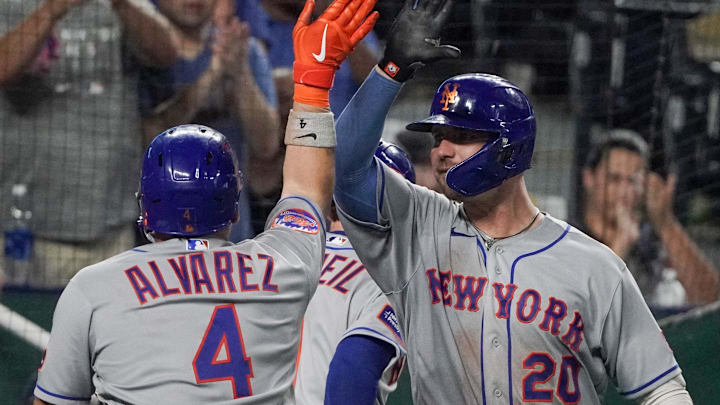The New York Mets had a great day yesterday. They blew a lead and fell to seven games back in the Wild Card race. They wasted home runs by Pete Alonso and Francisco Alvarez. They lost in extra innings in the Metsiest way possible, on a bases loaded balk. And they lost to the hapless Royals, conjuring painful memories of the 2015 World Series. Still, the Mets had a great day.
How can that be possible? This team has put its fans through the proverbial ringer all season, and if we're being honest, for most of our lives. Tuesday night's game was another low point in a season in which the low points have long since blurred together, coalescing into a months-long melange of mediocrity.
What happened in the time leading up to yesterday's 6 p.m. trade deadline is why Mets fans should actually be excited. Get pumped for a bumper crop of incoming young talent, sure, but even more than that, be glad that the decisions made reflect a team that is blessedly, finally, run by adults with a plan.
It might seem sad to an outsider for Mets fans to be excited about such a simple thing, but not if you've followed this team for any length of time. We've suffered through the Wilpons and the Steve Phillipses and Brodie van Wagenens of the world, and we've lived to tell the tale. If it's true that what doesn't kill you makes you stronger, then Mets fans could bench press the rest of the league.
Tuesday's trade deadline will go down as one of the best days in modern Mets history.
Let's recap everything that went down. The Mets traded Max Scherzer to the Texas Rangers on Sunday, receiving Luisangel Acuna, an athletic middle infielder that MLB.com has as the 44th-ranked prospect in all of baseball. If that last name sounds familiar, that's because his brother is frequent thorn in the Mets' side and Braves' center fielder Ronald Acuna. Losing Scherzer hurts, especially given the fanfare that his signing brought as the first big indication that Steve Cohen cared about winning much more than his predecessors.
It isn't fair to say that the Scherzer signing was a failure, but it certainly wasn't the slam dunk victory it seemed to be a year-and-a-half ago. Scherzer was good but not great in his time in New York, but at 38 years old, it was unrealistic to expect him to pitch like his former Cy Young self. With the Mets going nowhere this season, it's commendable that Billy Eppler and Steve Cohen took a step back and realized that a high-priced veteran pitcher doesn't have the same value to this franchise as a young athlete full of potential.
Trading experience for youth was the theme of the deadline for the Mets, as they also sent Justin Verlander back to Houston in exchange for the Astros' first- and fourth-ranked prospects, outfielders Drew Gilbert and Ryan Clifford. Just like the Scherzer deal, the Mets moved on from an aging veteran that no longer fits with the team's current situation, and they got a haul in return.
Both Scherzer and Verlander had to waive their no-trade clauses to allow these deals to happen, but it was made clear to them by the front office that the team is shifting into a transition period. For two future Hall of Famers that are chasing another ring but don't have time to wait, moving on to excellent AL West teams with a real chance to make a run both this year and next made a lot of sense.
The Mets weren't done meddling in the AL West race, as they also sent Dominic Leone to the Angels for infield prospect Jeremiah Jackson. Leone's contract with the Mets was set to expire at the end of the year, so swapping an average reliever that would likely walk in the offseason for an intriguing young talent was a no-brainer.
The Mets' other notable moves involved trading away two veteran outfielders and sending David Robertson to the Marlins in a move that seems like it happened eons ago. Mark Canha was traded to the Brewers, while Tommy Pham went to the Diamondbacks, and in all three deals, the Mets received young players with upside.
The Mets were the oldest team in the league this year, but with these deadline moves, they've gotten drastically younger, faster, and more athletic. Steve Cohen's ability to kick in cash on many of these deals likely netted the Mets better prospects, plus he can still use his deep pockets to woo quality replacements in free agency. Would you rather have Justin Verlander next year, or two top prospects in addition to, say, Blake Snell? Verlander has been one of the very best pitchers of the modern era, but that's an easy decision at this point in his career.
None of these moves should come as a surprise to anyone who watched Cohen's impromptu press conference a month ago. In it, he preached the long-term value of having a quality farm system. Everything the Mets did this trade deadline was done with that goal in mind.
Nobody likes to hear that the season is over, and unless the Mets' depleted remaining roster can conjure up a miracle, Citi Field will be dark and empty once the playoffs roll around, something that seemed unfathomable when the season began. This trade deadline was about much more than squeezing into the playoffs this year, though. It was about creating a foundation for sustained success. It was about knowing when you're beat, and planning for future battles that can still be won. Sometime in the not-so-distant future, Mets fans will look back and realize that yesterday was a great day.
